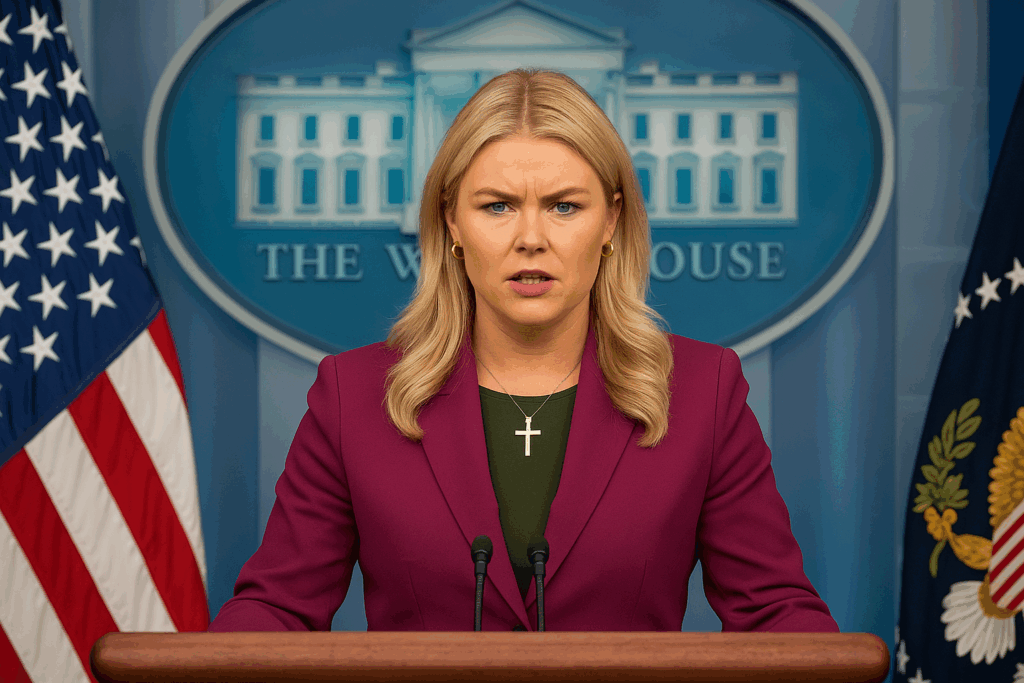 A New Face of Conservative Combat
A New Face of Conservative Combat
Karoline Leavitt came out swinging. Born and raised in Atkinson, New Hampshire, she grew up in a Catholic household, working summers at the family’s ice cream stand. It’s the kind of hometown upbringing that would make any New Englander nod with familiarity—scooping cones, smiling at locals, learning what it means to work for every dollar. But it didn’t take long for Leavitt to trade in the smell of waffle cones for the sharp scent of political ambition.
Leavitt’s rise has been anything but quiet. A softball scholarship took her to Saint Anselm College, where she majored in communications and minored in political science. For someone who once handled local summer crowds, she quickly found herself wading through far more turbulent waters. Fox News internships, a stint at the White House Office of Presidential Correspondence—Leavitt wasted no time setting her sights on the halls of power. She climbed the ranks quickly, first landing as a writer, then advancing to Associate Director before joining Kayleigh McEnany as Assistant Press Secretary. In a town where ambition is the currency, she seemed to have a vault full of it.
By 2021, she was the Communications Director for Rep. Elise Stefanik of New York. Say what you will about Leavitt, she’s not afraid of the fight. And if you’ve paid any attention to her style, you know it’s not about smoothing edges—it’s about sharpening them. Her congressional run in New Hampshire’s 1st District only cemented that image. She grabbed the Republican primary with both hands, leaning hard into her pro-Trump stance. But November wasn’t kind; Chris Pappas held the seat. Leavitt, undeterred, moved back to the trenches as National Press Secretary for Trump’s 2024 campaign.
Now she’s behind the podium as White House Press Secretary. At 27, she’s the youngest to ever hold the role. Her style? Combative, unyielding, and unapologetically partisan. Critics say she’s the bulldog Trump’s second term needs, while others claim she’s a bludgeon to journalistic integrity. Either way, Leavitt has made it clear she’s not here to play nice.
Of course, her path hasn’t been without missteps. In 2022, her congressional campaign got flagged by the FEC for alleged acceptance of donations over the legal limit—an issue that resulted in amended filings disclosing $326,370 in debts. Then there was that January 2025 press briefing, where she claimed $50 million of taxpayer money was being funneled for condoms in Gaza—a statement debunked almost immediately. Unfazed, Leavitt doubled down, issuing her usual brand of fiery retort to the fact-checkers.
Her personal life has been no less newsworthy. In January 2025, she married Nicholas Riccio, a real estate developer 32 years her senior. Their son was born in July 2024, and from the looks of it, Leavitt’s personal convictions—faith, family, and the conservative cause—remain deeply ingrained.
The question is, what does Leavitt really represent? To some, she’s the sharp edge of a younger, louder Republican movement. To others, she’s proof that brashness and blind loyalty have replaced tact and strategy. But if you ask me, Leavitt is the kind of political figure that doesn’t just toe the line—she redraws it. Whether that’s for better or worse is still up for debate.
As she continues her run as Trump’s voice to the world, one thing’s clear: Karoline Leavitt is not just riding the wave of conservative politics—she’s trying to reshape its current.

